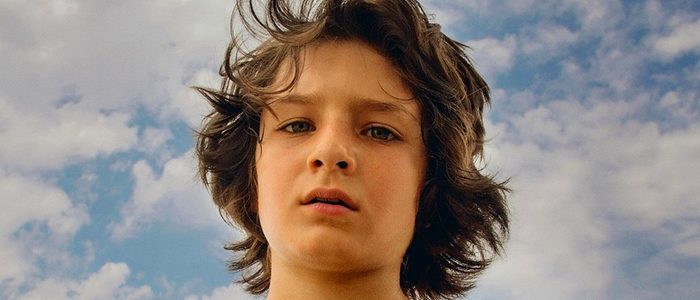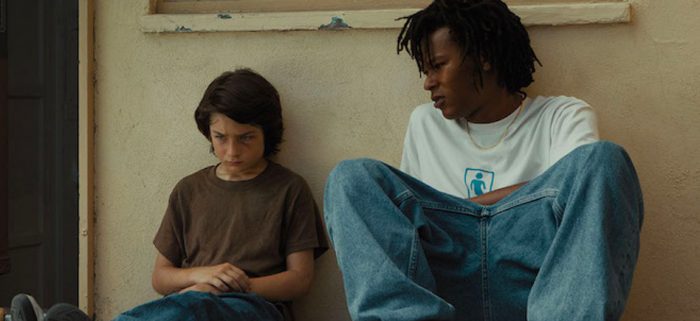'Mid90s' Is A Coming-Of-Age Classic That Replaces Nostalgia With Uncertainty [NYFF]
There's something boyish about the trailer and title for Jonah Hill's directorial debut; one might, from afar, call it juvenile. In an age where media has to hit familiar buttons just to be noticed, we're inundated with nostalgia properties at every turn, so it wouldn't be unreasonable to assume Mid90s is just another throwback. In some ways, it is. Hill fills the runtime with familiar, era-appropriate Hip Hop from wall to wall — A Tribe Called Quest, Cypress Hill, Big L, Wu-Tang and so on — resulting in an upbeat, contemplative mood evoked even further by composers Trent Reznor and Atticus Ross. And yet, what the film actually contemplates goes far beyond mere longing for a time and place. In fact, it hardly longs at all, opting instead to portray the more disquieting moments of boyhood, resulting (to my delight, and admittedly to my surprise) in one of the very best films of 2018. Between this and Don't Worry, He Won't Get Far on Foot, it's the year of Jonah Hill.
If Mid90s is indeed a semi-autobiographical nostalgia vehicle, it's a deeply selfless one. Hill, through a fearless performance from Sunny Suljic as Stevie, paints an honest portrait of the forces that govern carless youth, stepping back just enough to contextualize them from a wiser standpoint, though not so far that the film becomes a polemic on the past. In a pivotal scene in which Stevie tries to impress his new skater friends with a particularly risky jump, the film steps outside its '90s soundscape for what feels like the only time, using Omega's Gyöngyhajú lány (1969) as everything slows around Stevie. The part of the song that plays is the exact segment Kanye West's samples on New Slaves from his 2013 album Yeezus (it wouldn't be unreasonable to assume that's where Hill first heard the song; he's an avowed fan of Kanye's music). Given the fate that befalls Stevie — don't worry, he lives; the jump happens half way through the film — Hill's narrative perspective is simultaneously one of peering into the past and of unpacking it in the present, perhaps even changing how he sees the past, not unlike the way Kanye samples music.
How characters and events appear in retrospect is a key element of Mid90s. Stevie's aforementioned skater friends feel like something of an amorphous blob at first, visually introduced to us as a singular unit that Stevie observes from afar. Though as the film goes on and their individual lives begin to come to light, their placement and interactions within the seemingly shapeless group snap into place. The same is true for Stevie's older brother Ian (A24 darling Lucas Hedges), a caricature of a violent older sibling who Hill frames as unnaturally towering over Stevie. His insecure hues come into focus as he and Stevie head towards one another bit by bit, both in the form of a collision course and a subsequent road to brotherly reconciliation — a silent, repressed reconciliation, that is; Mid90s is devastating in its depiction of young masculinity, eventually reducing Ian to a cowering mess in a corner of its frame.

Hill seems unable to situate Stevie at first. Whether by error or intent, it's usually unclear where characters are sitting in relation to one another in the family scenes. Ian, Stevie and their mother Dabney (Katherine Waterston) are rarely given the luxury of establishing shots — Hill, like Stevie, has little interest in the shape of his L.A. hometown. The family is often introduced through uncomfortable dinner-time close ups with mismatched eye-lines that don't even tell you who's sitting on which side of the table, even as they converse. This visual disconnect continues whenever the three share the screen — Hedges even scowls at Waterston through a Bill Clinton mask whose eyes don't line up with his — a disorienting geographical (dis?)advantage of the 4:3 frame in a widescreen world. However, this disconnect is replaced by a definite directorial clarity whenever Stevie visits the local skate-shop and interacts with Ray (Na-kel Smith), Fuckshit (Olan Prenatt), Ruben (Gio Galicia) and Fourth Grade (Ryder McLaughlin), a mellow band of skaters of different ages and ethnicities. We're always introduced to them from afar as Stevie calculates his approach, grinning ear-to-ear as he's slowly inducted into a bizarre, made-up masculine hegemony (in which thanking someone is "gay"), learning the ways of the world from boys barely able to make sense of it themselves.
There's a silent hierarchy to the group, one that's semi-dependent on age (Ruben, the youngest until Stevie arrives, passes off waterboy duties to him) though on occasion, Stevie concludes that one's position in the group depends on whether or not one has a nickname. Fourth Grade and Fuckshit do. Ray and Ruben don't. Stevie doesn't, at first. Then he does, "Sunburn," which makes it all the more difficult for him to discern which members of the group to follow.

Ray, a conscientious Black skater who hopes to go pro, looks out for Stevie like a younger brother. His best friend Fuckshit, a mixed-race child from a privileged background, wanders through life in search of the next party. Ruben, both the scrawniest and most outwardly, aggressively hyper-masculine, bridges the age gap between Stevie and the older teens, but eventually grows jealous of Stevie's inclusion. And finally, Fourth Grade, the group's quiet, lanky, Caucasian filmmaker, who remains backgrounded until the reasons for his quietness become clear. None of the walls between these kids seem to matter when they're skating, though they're certainly ever-present, and learning about them in the first place is part of Stevie's education, taking him outside his white bubble for the first time. "What are 'black people'?" he asks innocently, sitting in on his first ever discussion about race, though this small step outside the privilege of whiteness is little in comparison to the way he's yanked into male adulthood faster than he can process.
This new male hierarchy liberates Stevie from his boring and oppressive home life. It even gives him a sense of power over Ian, who runs into Stevie's friends and steps backward for the first time after a lifetime of charging forward at Stevie. But it also traps Stevie, molding both him and his new friends in ways that are deeply uncomfortable to witness, and yet, deeply true-to-life. Not long after Stevie's first smoke and first beer, Hill chronicles Stevie's first sexual experience, in the film's most challenging scene. Stevie, like Suljic, is only twelve or thirteen. He lies about having slept around in Florida; what boy that age wouldn't when asked about his level of experience by an older girl at a party? (a rhetorical, time-period specific question) After having ascended in status within the group, changing his attire and speech-patterns to seem older than he is, Stevie is reduced to a child once more when this girl takes his clothes off, preparing him for something he thinks he ought to do, rather than something he necessarily wants to. He crosses his feet nervously, an action re-created by Lucas Hedges in Ian's pivotal moment of childhood regression, before the film cuts to the aftermath. En route to show off to his friends, Stevie is haunted by uncertainty. As Suljic saunters down a hallway to reunite with the group, he struggles to smile.
This marks a particular turning point for Stevie. His drunken stumble back home results in parental intervention, which only turns Stevie vicious. He drinks more. He ignores what little positive advice Ray can give him. He falls more in line with the drifting Fuckshit, whose own issues begin to clash with Ray's skating ambitions, precipitating the group's steady implosion. Suljic does tremendous work in Stevie's subsequent quiet moments, turning inward as he begins to observe the darker side to the structure he's been made a part of. Little by little, the rest of the group begins to reveal itself beyond the amorphous "cool," as described by Stevie. Ruben's aggression comes to light as a coping mechanism. Ray's ambition and protection of Stevie are given their own weighty explanation (a dramatically sound one, best left for discovery while watching). And while Fourth Grade gets the short end of the stick, having his backstory and motivations explained only in words, Fuckshit's increasingly rowdy antics, and the duplicitous albeit deeply pained motives behind them, come to light through silent glances. It's visual drama at its finest. (Without spoiling too much, Hill even directs a particularly effective car accident using a sudden, intrusive, out-of-place flash frame, and it's downright terrifying)
While the film has no real interest in Stevie's mother (one of only two female characters), it keeps her two-dimensional and at arm's length in order to contextualize her solely through the lens of motherhood as seen by frustrated teenage boys — for better or worse. And while this does result in Waterston's role being limited, she crafts a moving performance regardless, as on might expect from her. Interestingly, Waterston and Hedges get the bulk of the melodrama, while Ray, Fuckshit, Ruben and Fourth Grade's understated presence make them feel like they were living people picked off the street and made to re-enact their lives. Stevie's two worlds could not feel more different, and both he and the film are far more willing to explore the group, their stories and their dynamics than that of Stevie's domestic life. One might call this imbalance a shortcoming, even if it seems narratively intentional, but the film's compact runtime (a brisk 84 minutes) hits the sweet spot between fully forming the skateboarder characters and their world while leaving us wanting just a little more of them and their friendship with Stevie.
While the group's dynamic starts out hilarious, it morphs into something undeniably destructive and continues to be so for longer than is healthy for anyone involved. However Ray, the empathetic center, does eventually help Stevie move in a more positive direction. Whether skating alongside Stevie like an older sibling, or telling him to widen his perspective to accommodate the plight of others (including his mom), or gifting him a new skateboard that he tenderly assembles with his own hands while the two are illuminated by the setting sun. These instances are minor, but they're also framed as Ray providing a kind alternative to the toxicity imparted to Stevie by the rest of the group. Mid90s is a brilliant little delight that portrays the ridiculousness of adolescent masculinity, but it's also thoughtful enough to take it seriously, from self-destruction to the mere desire to be accepted. Suljic's Stevie is a wonderfully crafted character, and Jonah Hill may well have written and directed a coming-of-age classic.
